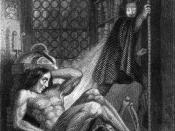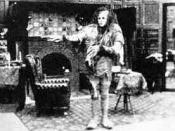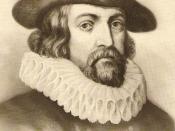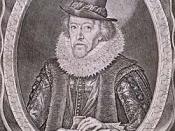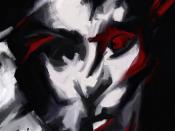The belief in science is a significant topic that has been talked about for centuries. The meaning has changed and differed throughout the years, and two well-known authors, Francis Bacon and Mary Shelley, both look at the results of science in their books The Advancement of Learning and Frankenstein, respectively. In The Advancement of Learning, Bacon explains that science involves knowledge, and that people should learn as much as they possibly can, as there should be no limit to what people should know. Shelley on the other hand, has a different view on science. She agrees that science involves knowledge and that it is a good thing to learn, but takes the more conservative route in saying that people need to watch how much they know and limit their science and knowledge.
The Advancement of Learning takes place in the 17th century, where not that many people knew about science and knowledge.
Bacon was one of the few that did though, and he believed that one should push himself or herself to know as much as one possibly can. Bacon thought differently of many people, but he believed what he thought was right and that there should be nothing to be afraid of.
One point Bacon made was that science had to do with religion and God, and that we get all of our knowledge through him. ÃÂÃÂ For all learning is knowledge acquired, and all knowledge in God is original: and therefore we must look for it by another name, that of wisdom or sapience, as the scriptures call it. ÃÂ Here Bacon is saying that wisdom is acquired by God and that we should exalt the glory of God through knowledge.
Later on in the book Bacon talks about famous people in that time period and how all of them are very knowledgeable. He uses Queen Elizabeth as an example, Alexander the Great, as well as Julius Caesar. All these people were very knowledgeable and are well known because of their pursuit of knowledge. Talking about Julius Caesar, Bacon writes, ÃÂThe excellency of his learning needeth not to be argued from his education, or his company, or his speeches; but in a further degree doth declare itself in his writings and works; whereof some are extant and permanent, and some unfortunately perished. ÃÂ Here Bacon is saying how knowledgeable Caesar is, and that it is proven in all of his writings and his works that he pushed himself to know as much as he could, and he benefited from it.
Bacon also talks about how one should learn, and that there are three important things to keep in mind, ÃÂThe works or acts of merit towards learning are conversant about three objects; the places of learning, the books of learning, and the persons of the learned. ÃÂ Here Bacon is saying that when people learn there are better ways in which they can enhance their learning. Where you learn, the books you read, and the people that you listen to and learn from are very important in your learning, and Bacon says you need to choose these things wisely in order to get better knowledge.
In looking through BaconÃÂs book The Advancement of Learning, one can clearly see BaconÃÂs view on science and knowledge. He believes that knowledge is power, and that the more you know the better. Why limit your knowledge when it doesnÃÂt hurt to find out as much as you can and to learn as much as you can. In Frankenstein, Shelley shows us her contrasting view on science. She believes that although science and knowledge is important, there needs to be a limit, and taking it too far can bear unwanted consequences. The pursuit of knowledge is clearly evident in Frankenstein, as Victor attempts to go beyond human limits and access the secret of life. Likewise, Robert Walton attempts to surpass previous human explorations by endeavoring to reach the North Pole. This ruthless pursuit of knowledge proves dangerous, as Victor's act of creation eventually results in the destruction of everyone dear to him, and Walton finds himself trapped between sheets of ice. Whereas Victor's obsessive hatred of the monster drives him to his death, Walton ultimately pulls back from his treacherous mission, having learned from Victor's example how destructive the thirst for knowledge can be.
Victor enters the university of Ingolstadt to study natural philosophy and chemistry. There, he is consumed by the desire to discover the secret of life and, after several years of research, becomes convinced that he has found it. Speaking about his teacher M. Waldman, Victor says, ÃÂHe then took me into his laboratory and explained to me the uses of his various machines, instructing me as to what I ought to procure and promising me the use of his own when I should have advanced far enough in the science not to derange their mechanism. He also gave me the list of books which I had requested, and I took my leave. ÃÂ This shows how much Victor Frankenstein is willing to push and pursue his knowledge of science.
Armed with the knowledge he has long been seeking, Victor spends months feverishly fashioning a creature out of old body parts. One climactic night, in the secrecy of his apartment, he brings his creation to life. ÃÂWith an anxiety that almost amounted to agony, I collected the instruments of life around me, that I might infuse a spark of being into the lifeless thing that lay at my feet. It was already one in the morning; the rain pattered dismally against the panes, and my candle was nearly burnt out, when, by the glimmer of the half-extinguished light, I saw the dull yellow eye of the creature open; it breathed hard, and a convulsive motion agitated its limbs. Frankenstein didnÃÂt have that much of a clue to what the monster would do or how it would be. He created a monster out of old body parts simply because of his desire and devotion for science. Not knowing its capabilities and impact on people is what eventually backfires on Frankenstein, and it turns out to be an unexpected disaster.
Just before departing Ingolstadt, he receives a letter from his father informing him that his youngest brother, William, has been murdered. Grief-stricken, Victor hurries home. While passing through the woods where William was strangled, he catches sight of the monster and becomes convinced that the monster is his brother's murderer. Arriving in Geneva, Victor finds that Justine Moritz, a kind, gentle girl who had been adopted by the Frankenstein household, has been accused. She is tried, condemned, and executed, despite her assertions of innocence. ÃÂNothing is more painful to the human mind than, after the feelings have been worked up by a quick succession of events, the dead calmness of inaction and certainty which follows and deprives the soul both of hope and fear. Justine died, she rested, and I was alive. ÃÂ Victor grows despondent, guilty with the knowledge that the monster he has created bears responsibility for the death of two innocent loved ones.
The monster just killed two of VictorÃÂs close oneÃÂs, but Victor still listens to the monster and does what he says. ÃÂYou must create a female for me with whom I can live in the interchange of those sympathies necessary for my being. This you alone can do, and I demand it of you as a right which you must not refuse to concede. ÃÂ This shows that Victor has pursued science and knowledge so much that he doesnÃÂt know where his limit is and where to stop. He is so concentrated on the monster that he created that even after it has killed two people, Victor still listens to it and complies in what he says.
One night, struck by doubts about the morality of his actions, Victor glances out the window to see the monster glaring in at him with a frightening grin. Horrified by the possible consequences of his work, Victor destroys his new creation. The monster, enraged, vows revenge, swearing that he will be with Victor on Victor's wedding night. Destroying his new creation is an example of how extreme one can get with their knowledge of so many things. Victor knew so much and he was crazy enough to listen to the monster in the first place and create another one. Then after all his hard work, he destroys is because of his first creation, the original monster.
Victor then dumps the second creature into a lake later on in the book. But in the morning, he is arrested and informed that he will be tried for a murder discovered the previous night. Victor denies any knowledge of the murder, but when shown the body, he is shocked to behold his friend Henry Clerval, with the mark of the monster's fingers on his neck. Victor falls ill, raving and feverish, and is kept in prison until his recovery, after which he is acquitted of the crime. This again shows the unwanted consequence of VictorÃÂs curiosity into making a monster. So far it has killed three people, and all of this has been on VictorÃÂs conscience.
At the end of the book during VictorÃÂs wedding, the monster ends up killing the bride Elizabeth, which is again another murder to add on to VictorÃÂs conscience. After that Victor promises to devote the rest of his life to finding the monster and getting revenge.
All of this was all because of the relentless pursuit of knowledge, and it ended up costing Victor his life. As we can see, there are many differences between The Advancement of Learning and Frankenstein. 19th century science has definitely changed from 17th century science, and it will continue to be a topic talked about for years to come.
Francis Bacon. The Advancement of Learning. New York: The modern library, 2001Mary Shelley. Frankenstein. New York: Bantam Bell, 1981
